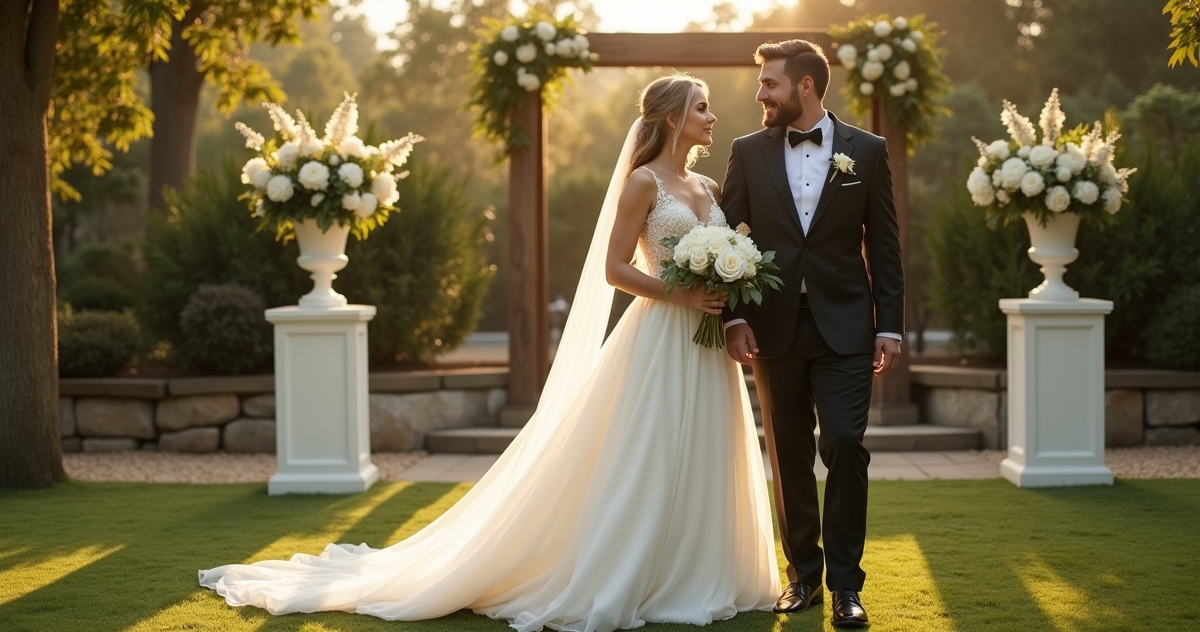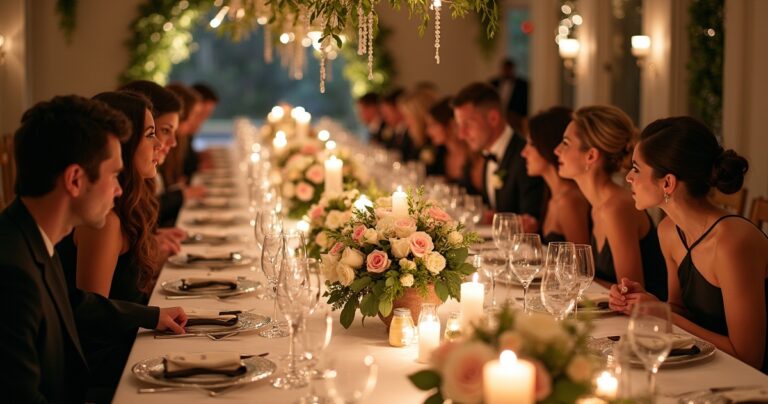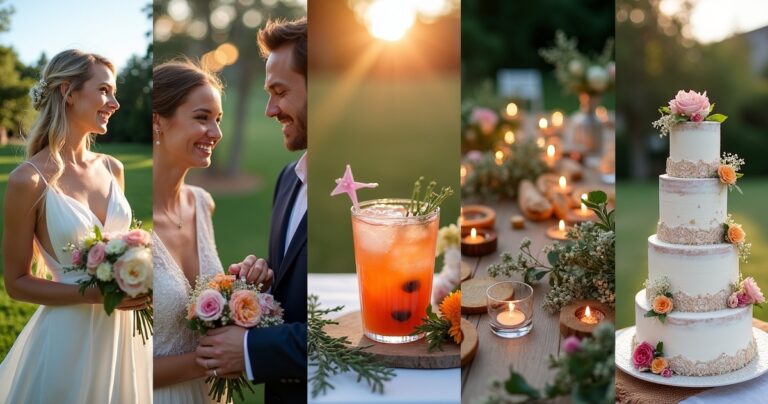Planning a wedding can be both exciting and overwhelming. One of the most crucial aspects of ensuring a smooth and memorable day is creating a well-structured timeline. This guide will help you craft the perfect timeline for your wedding day, ensuring every moment is cherished.
What is a Timeline for Wedding Day?
A wedding day timeline is a detailed schedule that outlines the sequence of events from the start to the end of your special day. It is essential because it helps coordinate all activities, ensuring that everything runs smoothly and on time. According to a survey by The Knot, couples who plan their timelines meticulously report a more enjoyable and stress-free wedding experience.
Key Components of a Wedding Day Timeline
A comprehensive wedding day timeline includes all major events such as the ceremony, reception, and any pre-ceremony activities. It also accounts for travel time, setup, and breakdown, ensuring no detail is overlooked.
- Ceremony and reception details
- Pre-ceremony preparations
- Travel and setup times
How to Create a Stress-Free Timeline for Wedding Day?
Start Planning Early
Begin crafting your timeline as soon as you set your wedding date. Early planning allows you to make adjustments and ensures that all vendors are available and aligned with your schedule.
Consider Your Venue and Guest Count
The size of your venue and the number of guests can significantly impact your timeline. Larger venues and guest lists may require more time for seating and transitions between events.
- Venue size considerations
- Guest count impact on schedule
Consult with Vendors
Engage with your vendors early in the planning process. Their expertise can provide valuable insights into how much time is needed for each part of the day.
- Vendor recommendations
- Aligning vendor schedules
What Should Be Included in a Timeline for Wedding Day?
Pre-Ceremony Activities
Pre-ceremony activities often include hair and makeup, getting dressed, and any pre-wedding photos. Allocate enough time for these activities to avoid feeling rushed.
Ceremony Details
The ceremony is the heart of your wedding day. Ensure you have a clear start time and allocate time for any special traditions or readings.
- Ceremony start time
- Special traditions
Reception Schedule
The reception is where the celebration truly begins. Plan for speeches, dinner, and dancing, ensuring each segment has enough time to be enjoyed.
- Dinner and toasts
- Dancing and entertainment
When Should Each Wedding Day Activity Begin?
Hair and Makeup
Hair and makeup should start early in the day, allowing ample time for any adjustments. Typically, this begins 4-5 hours before the ceremony.
Photography and Videography
Photographers and videographers should arrive early to capture pre-ceremony moments. Plan for them to start 2-3 hours before the ceremony.
- Pre-ceremony photos
- Capturing key moments
Ceremony Start Time
The ceremony usually begins in the late afternoon or early evening, depending on the season and venue. Ensure guests have enough time to arrive and be seated.
Reception Events
Reception events should follow a logical flow, starting with dinner and toasts, followed by dancing and entertainment.
- Dinner and toasts
- Dancing and entertainment
How Long Should Each Wedding Day Event Last?
Ceremony Duration
The average wedding ceremony lasts between 20-30 minutes, according to The Knot. This allows for vows, readings, and any special traditions.
Cocktail Hour
Cocktail hour typically lasts 1 hour, providing guests with time to mingle and enjoy refreshments while the couple takes photos.
- Guest mingling
- Refreshments and appetizers
Dinner and Toasts
Dinner and toasts usually take 1.5 to 2 hours, allowing for a relaxed dining experience and heartfelt speeches.
Dancing and Entertainment
Dancing and entertainment can last 2-3 hours, giving guests plenty of time to celebrate and enjoy the music.
- Music and dancing
- Entertainment options
What Are the Best Practices for Creating a Timeline for Wedding Day?
Build in Buffer Time
Include buffer time between events to account for any delays. This ensures the day remains stress-free and enjoyable.
Communicate with Vendors
Maintain open communication with your vendors to ensure everyone is on the same page. This helps prevent any last-minute surprises.
- Vendor coordination
- Open communication
Be Flexible and Adaptable
While having a timeline is crucial, it’s also important to remain flexible. Unexpected changes can occur, and being adaptable will help you handle them gracefully.
- Adapting to changes
- Handling unexpected events
How Can Couples Personalize Their Timeline for Wedding Day?
Incorporating Unique Traditions
Incorporate any cultural or family traditions into your timeline, allowing extra time for these special moments.
Planning for Special Moments
Plan for special moments such as a first look or private vows, ensuring they are included in your timeline.
- First look
- Private vows
Adjusting for Seasonal Considerations
Consider the season when planning your timeline. For example, a winter wedding may require an earlier ceremony start time due to shorter daylight hours.
- Seasonal adjustments
- Daylight considerations
What Are Common Mistakes to Avoid When Creating a Timeline for Wedding Day?
Overlooking Travel Time
Ensure you account for travel time between locations, especially if your ceremony and reception are at different venues.
Underestimating Setup and Breakdown
Allocate enough time for setup and breakdown, ensuring vendors have ample time to prepare and pack up.
- Setup time
- Breakdown time
Forgetting to Include All Key Events
Ensure all key events are included in your timeline, from the ceremony to the last dance.
- Key event inclusion
- Comprehensive planning
How Can a Wedding Planner Help with the Timeline for Wedding Day?
Professional Expertise and Experience
A wedding planner brings professional expertise and experience, helping you create a seamless timeline.
Vendor Coordination
Wedding planners coordinate with vendors, ensuring everyone is aligned and the day runs smoothly.
- Vendor alignment
- Seamless coordination
Day-of Management
On the day of the wedding, a planner manages the timeline, allowing you to focus on enjoying your special day.
- Day-of coordination
- Stress-free management
What Tools Can Help Couples Create a Timeline for Wedding Day?
Wedding Planning Apps
Wedding planning apps offer templates and tools to help you create a detailed timeline.
Spreadsheets and Templates
Spreadsheets and templates provide a structured way to organize your timeline, ensuring no detail is overlooked.
- Timeline templates
- Structured organization
Professional Planning Services
Consider hiring professional planning services for expert guidance and support in creating your timeline.
- Expert guidance
- Professional support
How Far in Advance Should Couples Finalize Their Timeline for Wedding Day?
Recommended Timeline
Finalize your timeline at least one month before the wedding, allowing time for any adjustments.
Adjustments and Revisions
Be prepared to make adjustments and revisions as needed, ensuring the timeline remains accurate.
- Timeline adjustments
- Revision process
Sharing with Vendors and Wedding Party
Share the finalized timeline with vendors and the wedding party, ensuring everyone is informed and prepared.
- Vendor communication
- Wedding party briefing
What Are Some Sample Timelines for Different Types of Weddings?
Traditional Evening Wedding
A traditional evening wedding typically starts with a late afternoon ceremony, followed by a cocktail hour and evening reception.
Daytime Garden Wedding
A daytime garden wedding often begins with a morning ceremony, followed by a brunch or lunch reception.
- Morning ceremony
- Brunch reception
Destination Wedding
Destination weddings may require additional time for travel and setup, with events spread over multiple days.
- Travel considerations
- Multi-day events
How Does the Timeline for Wedding Day Impact Photography and Videography?
Capturing Key Moments
A well-planned timeline ensures photographers and videographers capture all key moments, from the first look to the last dance.
Lighting Considerations
Consider lighting when planning your timeline, ensuring optimal conditions for photos and videos.
- Optimal lighting
- Photo and video quality
Coordinating with Other Vendors
Coordinate with other vendors to ensure photographers and videographers have access to all areas and events.
- Vendor coordination
- Access to events
What Contingency Plans Should Be Included in a Timeline for Wedding Day?
Weather-Related Adjustments
Plan for weather-related adjustments, such as moving an outdoor ceremony indoors in case of rain.
Vendor Delays or Cancellations
Have a backup plan for vendor delays or cancellations, ensuring the day can proceed smoothly.
- Backup vendors
- Contingency planning
Guest-Related Issues
Prepare for guest-related issues, such as transportation delays or last-minute changes.
- Guest transportation
- Last-minute changes
How Can Couples Ensure Their Timeline for Wedding Day Runs Smoothly?
Designating a Coordinator
Designate a coordinator to manage the timeline and handle any issues that arise on the day.
Briefing the Wedding Party
Brief the wedding party on the timeline, ensuring everyone knows their roles and responsibilities.
- Wedding party roles
- Timeline briefing
Having a Detailed Schedule
A detailed schedule helps ensure the day runs smoothly, with all events occurring on time.
- Detailed planning
- On-time events
FAQs
What is the ideal length for a wedding ceremony?
The ideal length for a wedding ceremony is typically between 20-30 minutes. This duration allows for vows, readings, and any special traditions without feeling rushed.
How much time should be allocated for wedding photos?
Wedding photographers typically recommend allocating 1-2 hours for couple and wedding party photos. This ensures enough time to capture all desired shots without feeling rushed.
When should the reception end according to the timeline for wedding day?
Most receptions last 4-5 hours, with the timeline often concluding around 11 PM or midnight. This allows guests to enjoy the celebration without feeling too tired.
How can couples accommodate cultural traditions in their timeline for wedding day?
Couples should discuss cultural elements with their families and incorporate them into the timeline. Allow extra time as needed to ensure these traditions are honored.
What is the best time for a first look in the timeline for wedding day?
Many couples choose to have their first look 2-3 hours before the ceremony. This allows ample time for photos and a private moment before the festivities begin.







